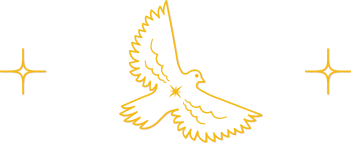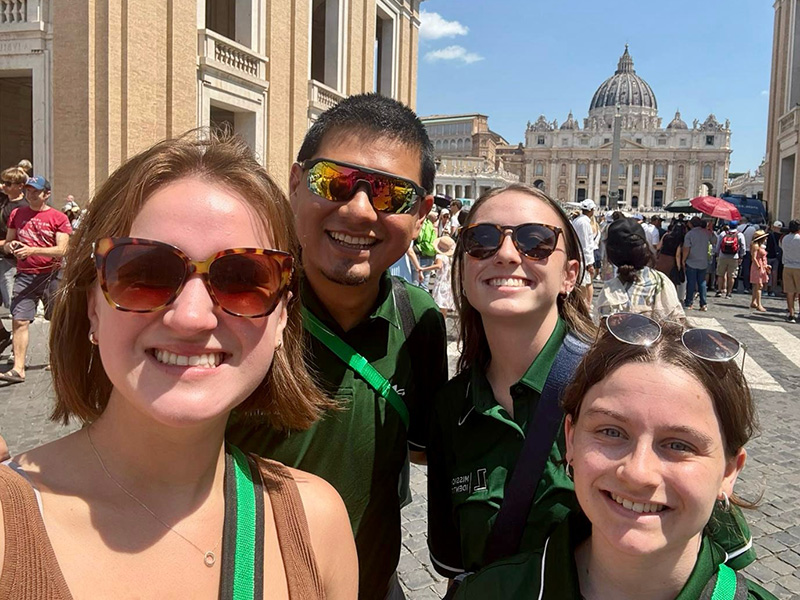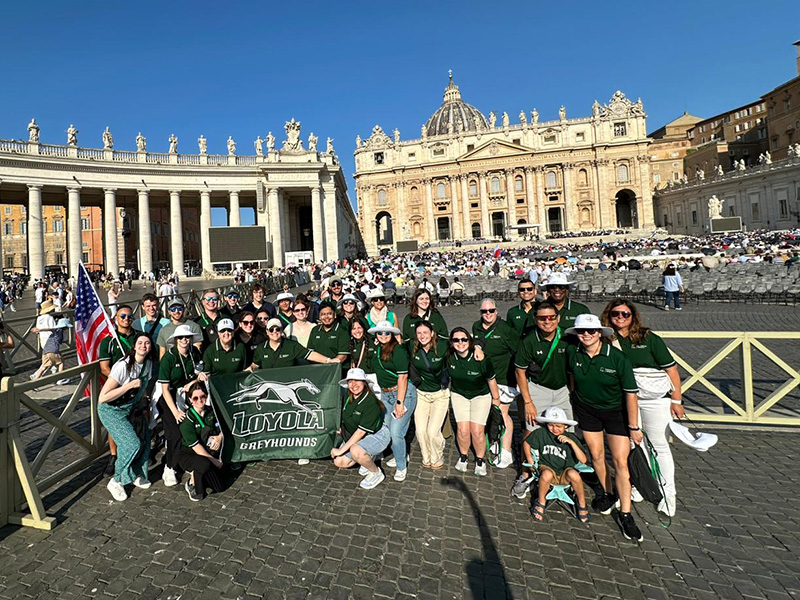Pope Leo XIV Inspires Optimism Amid Change
Loyola thought leaders offer insight into a new chapter in Church history George P. Matysek, Jr., ’94
As the College of Cardinals met in the Sistine Chapel this spring to elect a successor to Pope Francis, Emily Kane, ’14, director of campus ministry, sensed unease among many of her students.
“I think we were feeling the loss [of Francis] still so deeply—and I was definitely absorbing my students’ nerves,” said Kane. “There was a lot of fear around what this next pope might bring.”
For Kane, the uncertainty included concerns about inclusion in the Church and the future of the Church’s commitment to social justice and the pursuit of global peace—hallmarks of Pope Francis’ leadership that shaped her own ministry.
But when French Cardinal Dominique Mamberti announced to the world May 8 that Cardinal Robert F. Prevost had been elected pope and that he was taking the name Leo XIV, Kane’s concerns eased.
By adopting the name of Leo XIII, Pope Leo XIV signaled his commitment to the earlier pope’s vision of a Church responsive to the social and economic challenges of its era. Pope Leo XIII was the author of Rerum Novarum, the groundbreaking encyclical written in 1891 that laid the foundation for modern Catholic social teaching and addressed the dignity and rights of workers.
“The first thing I told my students when I heard his name is, ‘We’re good!’” Kane remembered with a laugh.

Forging a Path
Many in the Loyola community are hopeful Pope Leo XIV will build on the legacies of Francis, Leo XIII, and others, while forging a path shaped by his own experiences and perspective.
Listening to Pope Leo’s first address after his election, Milton Javier Bravo, Ph.D., vice president for mission and identity, was filled with great hope.
“He spoke to the Diocese of Rome and said, ‘Let’s be welcoming to all,’” said Bravo. “What it does to the American church will still be determined in the years to come, but what a joy—and what a surprise to have an American pope.”
Photo credit: Alessia Pierdomenico
The Rev. Steve Spahn, S.J., assistant teaching professor of theology and assistant to the director of mission integration at Loyola, said it was telling that in his first address to cardinals as leader of the Catholic Church, Pope Leo XIV gave the “most full-throated endorsement of Vatican II possible.”
Equally notable, Fr. Spahn said, was the new pope’s embrace of Pope Francis’ joyful approach to evangelization in his leadership.
“That, in my mind, says it all,” Fr. Spahn said.
Yet stylistic differences are already emerging. Memorably, Pope Leo appeared on the balcony of St. Peter’s Basilica wearing the traditional red mozzetta—a cape Pope Francis had eschewed in favor of simpler white vestments.
“Frankly, I’m grateful for Pope Leo’s obvious preference for the more traditional trappings of the papacy,” Fr. Spahn said. “I think it will go a long way toward building goodwill and trust with more traditional Catholics.”

Firsts for the Papacy
Frederick “Fritz” Bauerschmidt, Ph.D., professor of theology, highlighted the historic nature of the election. The Church now has its first U.S.-born pope, its first Augustinian pope—and its first pope who had a personal Twitter account before taking the Chair of St. Peter.
“He has spent a lot of his life in the digital world,” said Bauerschmidt, who is also a deacon in the Archdiocese of Baltimore. “I think he has maybe more of an intuitive feel—both for the promises and the dangers of that digital world.”
Only a few days into his papacy, Pope Leo was already warning of possible dangers posed by AI—insisting that artificial intelligence should be a tool, not a replacement for human intelligence.
“Just as the Industrial Revolution during the time of Leo XIII brought a lot of benefits, but also a lot of social disruption, I think the AI revolution is going to have a similar effect,” Bauerschmidt said. “Many jobs, including high-paying jobs like computer programmers, are going to be vanishing. Pope Leo is very astute to see this as a really pressing issue for the Church to be thinking about.”
Even as Pope Leo XIV addresses modern challenges such as artificial intelligence with a strong sense of direction, his approach to leadership differs from that of his predecessor.
Pope Leo XIV appears more deliberate and cautious in his public statements, while Francis was known for spontaneous, sometimes controversial remarks that generated intense reactions both positive and negative.
Drawing on a friend’s observation, he compared the current papal transition to Pope Paul VI following Pope John XXIII during the Second Vatican Council era.
“John was good at starting the reforms, but you needed someone like Paul VI to bring the council to a successful conclusion—someone who was a bit more cautious and more attentive to the details,” Bauerschmidt said.
He hopes Pope Leo XIV can serve as a unifying figure for both the Church and a divided world.

A Call for Peace
Mary Kate Schneider, Ph.D., Loyola’s director of Global Studies and associate teaching professor of political science, said it is exciting that on his very first day as pontiff, the new pope spoke of peace.
“He’s quite the opposite of bellicose,” Schneider said. “I think he has the ability and certainly the power to influence public opinion. There are over a billion Catholics in the world—and if the message from the Vatican is that of peace, then I think you have a lot of people who want to listen to that.”
Some have noted that Pope Leo may be the most international pope in the more than 2,000-year history of the Church. Born in Chicago, he knows the Western world well. But he also served as a missionary to Peru, the global leader of his Augustinian religious order, bishop of the Peruvian Diocese of Chiclayo and the man selected by Pope Francis to help pick bishops around the world.
“People who have more exposure to the world tend to be more sympathetic to it,” Schneider said. “I think that his experience of not just visiting but really living amongst the people in various parts of the world is absolutely going to shape his papacy.”
Photo credit: Alessia Pierdomenico
That global voice has already spoken out for an end to war. The new pope has called for a ceasefire in Gaza and has shown a willingness to help broker peace in Ukraine.
“Seeing him speak so clearly and openly about the bombing of the Catholic church in Gaza was really wonderful and what I hope to see from a pope,” Kane said. “I appreciate that continuation of not hiding the message and the teaching and the wisdom of the Catholic Church.”

A Friend and Advocate
That clarity of voice reflects a deeper concern for the marginalized—one that takes on added meaning given a discovery made shortly after his election.
The Rev. Gregory Chisholm, S.J., superior of the Baltimore Jesuit community, noted that a genealogist discovered the new pope has Black Creole ancestry. His Creole ancestors, a historically marginalized group in New Orleans, had relocated and “passed” as white, a survival strategy common during a strictly segregated era. It’s not known whether the pope previously knew of his Creole roots.
Quite independent of whatever his origins are, Pope Leo XIV has consistently been a vocal advocate for the marginalized in South America, demonstrating his commitment to supporting those enduring severe economic or political hardship, Fr. Chisholm said.
“They always seem to have a friend in the person of Robert Prevost,” he said.

An Invitation to Youth
Looking to the future, Laura McCormack, ’14, Loyola’s associate director of liturgy and music, said she hopes Pope Leo will “speak in the language of the young.” “I hope he speaks on those issues that matter to youth. Then he might help them to see the Church as a living, breathing body that they should be a part of—that they should help continue into the next chapter.”

 Loyola students, faculty, staff, and clergy traveled to Rome for the 2025 Jubilee and audience with Pope Leo XIV.
Loyola students, faculty, staff, and clergy traveled to Rome for the 2025 Jubilee and audience with Pope Leo XIV.
Read more about the Loyola pilgrimage to Rome